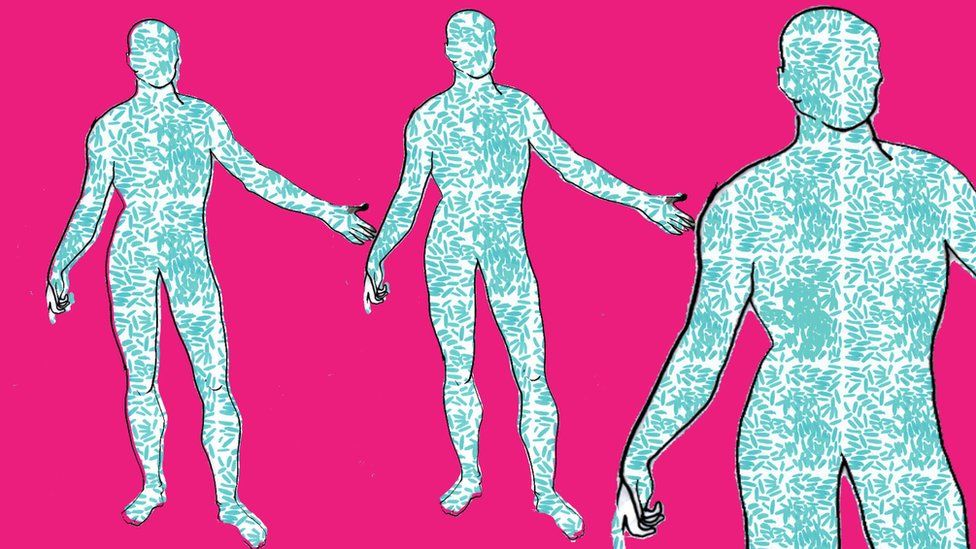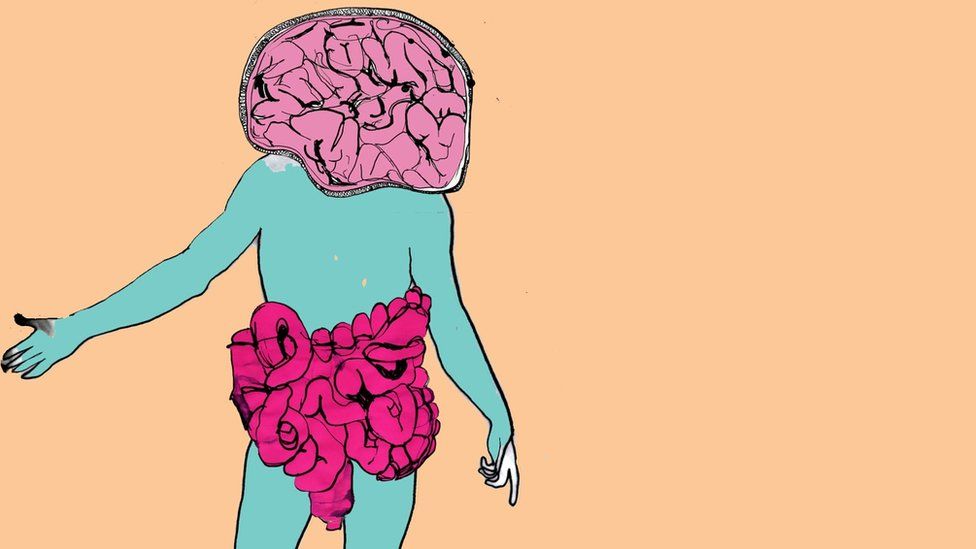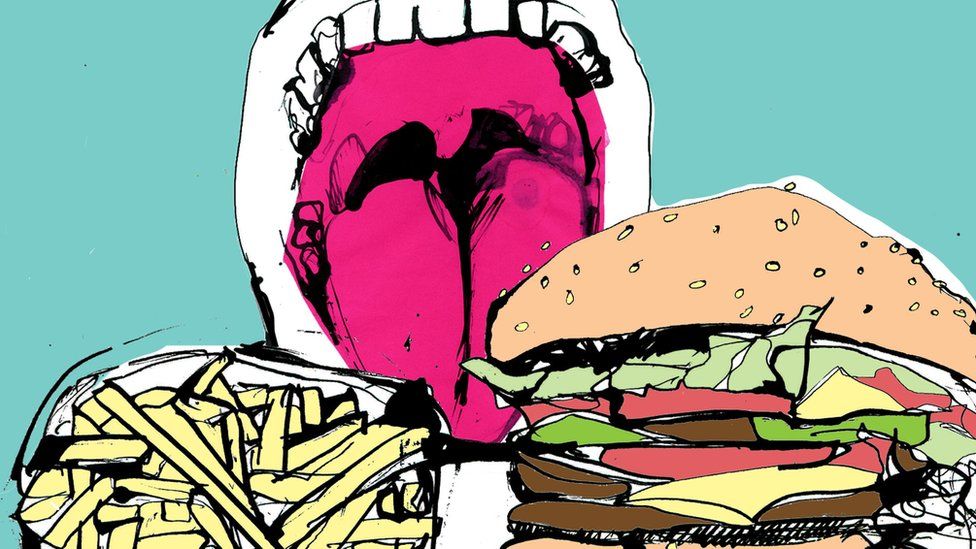THIS SCIENTIST USES 100% OF HIS BRAIN, AND SO DO YOU!
ROB DESALLE ANSWERS QUESTIONS FROM CHILDREN ABOUT THE HUMAN BRAIN.
KID'S VOICE: Is the brain really squishy? And why is it all wrinkly?
On screen text: Hannah P., Age 7, New Jersey
Scene change to ROB DESALLE wearing a jean jacket, sitting in a lab.
ROB DESALLE: Yes, the brain is quite squishy. Your brain is made mostly of water. So, if you took it out of your head and tried to hold it in your hands, it would feel a lot like Jell-O. The wrinkles on your brain are because you have to cram about two and a half square feet of tissue into your skull. If you took a towel that was about two and a half feet square and tried to squish it into the size of your head, it would have lots of wrinkles on it.
ASK A SCIENTIST: Brain – How Big Is a Brain?
KID'S VOICE: On average, how big is an 11-year-old kid's brain?
On-screen text: Olivia L., Age 11, California
ROB DESALLE: It's about the same size as an adult's brain. There about 100 billion cells in both brains. And the brain of a kid weighs about three pounds, as does the brain of an adult. It's about this size.
DeSalle holds his hands to about the size of a cantaloupe melon.
ASK A SCIENTIST: Brain – Why Can Humans Only Use 10% of Their Brain?
KID'S VOICE: Why can humans only use 10% of their brains?
On screen text: Michael D., Age 10, New York
ROB DESALLE: The idea that they would use 10% of their brain is actually a myth. We don't know when the myth was started, but we do know that people do use 100% of their brain. Every part of their brain is important. No part of their brain is left unused during any period of their day.
ASK A SCIENTIST: Brain – What’s the Most Important Part of the Brain?
Title slide: Outline of a human brain on a blue background.
KID'S VOICE: What is the most important part of the brain?
On screen text: Kylar G., Age 9, Texas
ROB DESALLE: Every part of your brain is important. Every part of your brain has a function. And every part of your brain is connected to other parts of your brain. Those connections are very important for the proper functioning of your brain and for your survival.
However, if you want to ask what part of your brain is the most important for being human, then that might be your prefrontal cortex, that area of your brain that's just behind your forehead. If you wanted to ask what part of the brain is important for me when I get afraid and want to run away, then that part of your brain is your limbic system, which is much deeper into your brain. So, the answer of the question depends on what you mean by important.
ASK A SCIENTIST: Brain – Can a Person Live Without a Brain?
Title slide: Outline of a human brain on a blue background.
KID'S VOICE: Can a person live without a brain?
On screen text: Carson L., Age 7, Toronto
ROB DESALLE: A person cannot live without a brain. The brain actually has many functions that keep the heart beating and your lungs expanding and contracting. So, there are various parts of your brain that are really important for your bodily functions. But mostly your brain is absolutely necessary for thinking and for being conscious and for being human. So, you can't live without a brain.
You can live with parts of your brain removed, and there are some operations that are being done nowadays on people with epilepsy where parts of their brains are removed to stop the epilepsy. And these people survive very nicely and lead very, very normal lives.
ASK A SCIENTIST: Brain – How Come I Can’t Remember All 50 States Unless I Sing the Song That Has Them All In It?
Title slide: Outline of a human brain on a blue background.
KID'S VOICE: How come I can't remember all 50 states unless I sing the song that has them all in it?
On screen text: Christina S., Age 14, New York
ROB DESALLE: Our memories are actually really bad. Most of us can only remember about seven numbers at a time. So, what we do to remember long strings of things, is we do a thing called chunking. And the song helps you chunk information together into different parts, that you can remember individually. And so that's what the song does--it helps you place these states into other groups of things--that allow you to remember things better.
ASK A SCIENTIST: Brain – What About My Brain Makes Me a Good Speller Or a Good Goalie?
Title slide: Outline of a human brain on a blue background.
KID'S VOICE: What about my brain makes me a good speller or a good goalie?
On screen text: Ashton A., Age 8, Washington D.C.
ROB DESALLE: And so, your brain has a lot of functions, like singing, learning languages, playing sports, things like that. And the way that you get better at these things is by forging connections between neurons. And these connections are forged by practice really. Every time you do something, your brain changes. And it changes because of the connections that are being made.
The connections get stronger and stronger the more and more you do something. So, the answer to the question is really practice. Practice makes you a better speller, a better person at language, and a better hockey player.
ASK A SCIENTIST: Brain – What Causes Dementia?
Title slide: Outline of a human brain on a blue background.
KID'S VOICE: What causes dementia?
On screen text: Catherine S., Age 10, New York
ROB DESALLE: Dementia is the state where someone is losing their memory really and losing their touch with reality. And dementia is caused by the death of brain cells usually in older people. One of the most severe forms of dementia that we know about is a disease called Alzheimer's syndrome. In this syndrome, part of the brain starts to die, parts of the brain start to die, and this is what causes the loss of memory and the loss of bodily function in people who have Alzheimer's disease.
ASK A SCIENTIST: Brain – Can We Connect Computers To Our Brains?
Title slide: Outline of a human brain on a blue background.
KID'S VOICE: Can we connect computers to our brains?
On screen text: Jason C., Age 9, Minnesota
ROB DESALLE: Interaction of your brain with computers is an interesting subject. Some studies are being done right now where computers have been hooked up to the brains of people. These are usually people who have severe epilepsy, and the hookups are there to help them with epilepsy. But the signals from their brains can actually be collected and analyzed in a computer.
This is just one form of future technology for how we will manipulate the brain in the future. There are other forms of technology that allow us to stimulate the brain with magnetism, or to stimulate the brain with electricity. And these forms of stimulation are thought to be useful in curing disorders of the brain, but can also help with things like memory, and other kinds of brain functions.
So, in the future, we're going to see more and more of this kind of work. But the question that we should be asking is, really, should we be doing this?
ASK A SCIENTIST: Brain – Do Plants Have Brains? Do All Animals Have Brains?
Title slide: Outline of a human brain on a blue background.
KID'S VOICE: Do plants have brains? Do all animals have brains?
On screen text: John M., Age 8, Virginia
ROB DESALLE: Lower organisms--like plants--don't have brains, but plants do have electrical current in them. And they do have genes for some of the proteins that are in our brains. The animals, that are primitive animals-- like sponges-- don't have brains either. They don't have nerve cells, but they do--like the plants--have genes for brains.
Cnidaria--things like jellyfish and hydra--are organisms that have what are called, neural nets. And these are nerve cells that form a net, but not a brain. It's only when we get to animals that have-- that are the same on the left side and on the right side--that we find brain.
ASK A SCIENTIST: Brain – What Happens To Our Brains When We Get Scared?
Title slide: Outline of a human brain on a blue background.
KID'S VOICE: What happens to our brains when we get scared?
On screen text: Jaqueline W., Age 7, Michigan
ROB DESALLE: When we're startled or scared, the information that scares us-- or startles us-- comes into our brain. And it's first processed in what's called the limbic system-- in an organ called the amygdala. It's a tiny little peanut-size part of our brain. And what happens is that part of our brain then sends out messages to other parts of our brain-- that produce hormones-- that allow us to tense up and get sweaty palms, and get ready to run.
Now what's happened in recent research, is that the prefrontal cortex-- again, the part of the brain behind your forehead-- is now thought to be involved in what happens when we get afraid. Because sometimes when you are startled, you don't need to be startled. And your prefrontal cortex, now, is going to judge whether or not the amygdala should actually turn on the hormones or not.
ASK A SCIENTIST: Brain – What Happens To My Brain When I’m Sleeping?
Title slide: Outline of a human brain on a blue background.
KID'S VOICE: What happens to my brain when I'm sleeping?
On screen text: Ana G., Age 9, Nebraska
ROB DESALLE: When you're sleeping, your brain goes through several phases. It goes through several phases-- like deep sleep and light sleep. But the most important-- to me at least-- phase, is that phase called rapid eye movement--or REM. This is the phase where you do some of your dreaming. Next time you see your cat asleep or your dog asleep--take a look at them, and you'll see their eyes moving underneath their eyelids. This is rapid eye movement, and it's the very interesting part of sleep.
ASK A SCIENTIST: Brain – Can Exercise Make Me Smarter?
Title slide: Outline of a human brain on a blue background.
KID'S VOICE: Can exercise make me smarter?
On screen text: Caden C., Age 11, Tennessee
ROB DESALLE: Scientists have shown that exercise does make your brain grow. In fact, in studies where kids have been looked at who have exercised-- relative to kids who don't exercise--a part of their brain, called the basal ganglia, gets larger. And this basal ganglia is there for processing information that comes into your brain.
Other kids in other studies have been shown to have better memories when they exercise. And a part of their brain--called the hippocampus--is actually larger when kids exercise. So, exercise does have an effect on how your brain works and the size of your brain. And if this is correlated to how smart you are--then yes, exercise does have an effect on how smart you are.
ASK A SCIENTIST: Brain – Is It True That People Used To Drill Holes In Their Brains To Release Spirits?
Title slide: Outline of a human brain on a blue background.
KID'S VOICE: Is it true that people used to drill holes in their brain to release spirits?
On screen text: Calvin H., Age 10, Ohio
ROB DESALLE: A lot of cultures and a lot of people in the past--so thousands of years ago--in ancient Rome, ancient Greece, and even in the Incan civilizations--used to do that. And they did that because they were trying to cure people who had mental disorders--such as depression or schizophrenia. And they didn't know that much about the brain, and so they didn't know what the holes were actually doing. And often times it didn't work and caused the death of the people.
Today, with the new brain-imaging technology that's out there--technologies such as magnetic resonance imaging, pet scanning, and CAT scanning--we can look at the brains of people without having to open their skulls and look inside. And we're getting a very precise picture of what the brain looks like-- of the structures in the brain.
And actually, what structures are causing what disorders--what structures are causing what mental disorders. And so, we can go in--and very precisely now, surgeons can--and work on those parts of the brain with much more precision than we've ever had in the past.
ASK A SCIENTIST: Brain – What Is the Silliest Thing That Humans Used To Believe About the Brain That We Now Know Isn’t True?
Title slide: Outline of a human brain on a blue background.
KID'S VOICE: What is the silliest thing that humans used to believe about the brain that we now know isn't true?
On screen text: Matt T., Age 11, Florida
ROB DESALLE: Actually, one of the smartest people who ever lived--Aristotle, an ancient Greek philosopher--thought that our nervous system--our ability to think and to have emotions--resided in our heart, not our brain. He actually called our brain a pretty useless organ. That's one of the silliest things that I've ever heard of--but it comes from a very, very smart person.






